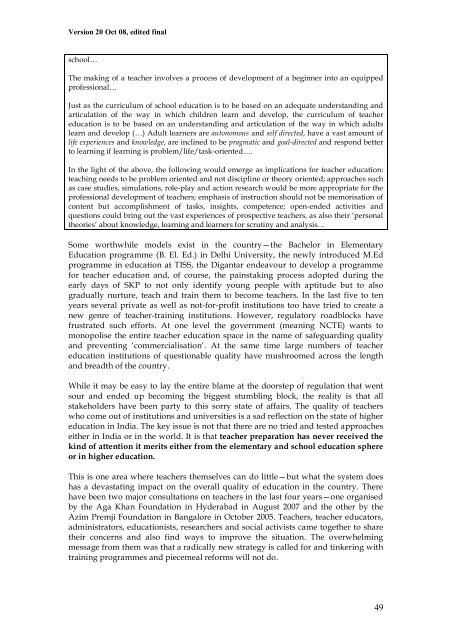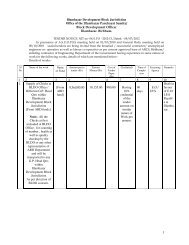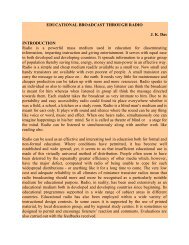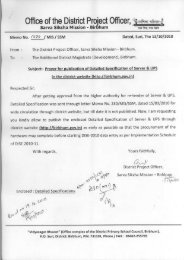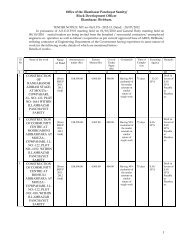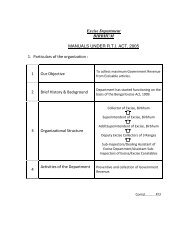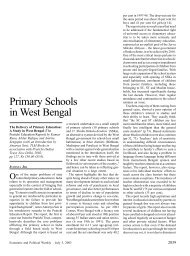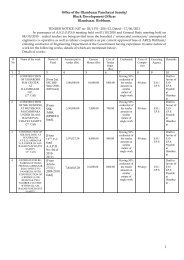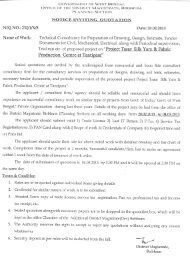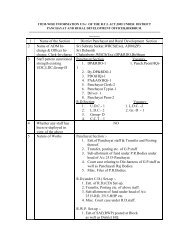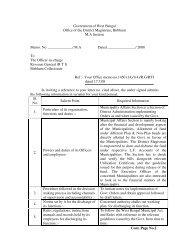primary school teachers the twists and turns of ... - ERU Consultants
primary school teachers the twists and turns of ... - ERU Consultants
primary school teachers the twists and turns of ... - ERU Consultants
You also want an ePaper? Increase the reach of your titles
YUMPU automatically turns print PDFs into web optimized ePapers that Google loves.
Version 20 Oct 08, edited final<strong>school</strong>…The making <strong>of</strong> a teacher involves a process <strong>of</strong> development <strong>of</strong> a beginner into an equippedpr<strong>of</strong>essional…Just as <strong>the</strong> curriculum <strong>of</strong> <strong>school</strong> education is to be based on an adequate underst<strong>and</strong>ing <strong>and</strong>articulation <strong>of</strong> <strong>the</strong> way in which children learn <strong>and</strong> develop, <strong>the</strong> curriculum <strong>of</strong> teachereducation is to be based on an underst<strong>and</strong>ing <strong>and</strong> articulation <strong>of</strong> <strong>the</strong> way in which adultslearn <strong>and</strong> develop (…) Adult learners are autonomous <strong>and</strong> self directed, have a vast amount <strong>of</strong>life experiences <strong>and</strong> knowledge, are inclined to be pragmatic <strong>and</strong> goal-directed <strong>and</strong> respond betterto learning if learning is problem/life/task-oriented….In <strong>the</strong> light <strong>of</strong> <strong>the</strong> above, <strong>the</strong> following would emerge as implications for teacher education:teaching needs to be problem oriented <strong>and</strong> not discipline or <strong>the</strong>ory oriented; approaches suchas case studies, simulations, role-play <strong>and</strong> action research would be more appropriate for <strong>the</strong>pr<strong>of</strong>essional development <strong>of</strong> <strong>teachers</strong>; emphasis <strong>of</strong> instruction should not be memorisation <strong>of</strong>content but accomplishment <strong>of</strong> tasks, insights, competence; open-ended activities <strong>and</strong>questions could bring out <strong>the</strong> vast experiences <strong>of</strong> prospective <strong>teachers</strong>, as also <strong>the</strong>ir ‘personal<strong>the</strong>ories’ about knowledge, learning <strong>and</strong> learners for scrutiny <strong>and</strong> analysis…Some worthwhile models exist in <strong>the</strong> country—<strong>the</strong> Bachelor in ElementaryEducation programme (B. El. Ed.) in Delhi University, <strong>the</strong> newly introduced M.Edprogramme in education at TISS, <strong>the</strong> Digantar endeavour to develop a programmefor teacher education <strong>and</strong>, <strong>of</strong> course, <strong>the</strong> painstaking process adopted during <strong>the</strong>early days <strong>of</strong> SKP to not only identify young people with aptitude but to alsogradually nurture, teach <strong>and</strong> train <strong>the</strong>m to become <strong>teachers</strong>. In <strong>the</strong> last five to tenyears several private as well as not-for-pr<strong>of</strong>it institutions too have tried to create anew genre <strong>of</strong> teacher-training institutions. However, regulatory roadblocks havefrustrated such efforts. At one level <strong>the</strong> government (meaning NCTE) wants tomonopolise <strong>the</strong> entire teacher education space in <strong>the</strong> name <strong>of</strong> safeguarding quality<strong>and</strong> preventing ‘commercialisation’. At <strong>the</strong> same time large numbers <strong>of</strong> teachereducation institutions <strong>of</strong> questionable quality have mushroomed across <strong>the</strong> length<strong>and</strong> breadth <strong>of</strong> <strong>the</strong> country.While it may be easy to lay <strong>the</strong> entire blame at <strong>the</strong> doorstep <strong>of</strong> regulation that wentsour <strong>and</strong> ended up becoming <strong>the</strong> biggest stumbling block, <strong>the</strong> reality is that allstakeholders have been party to this sorry state <strong>of</strong> affairs. The quality <strong>of</strong> <strong>teachers</strong>who come out <strong>of</strong> institutions <strong>and</strong> universities is a sad reflection on <strong>the</strong> state <strong>of</strong> highereducation in India. The key issue is not that <strong>the</strong>re are no tried <strong>and</strong> tested approachesei<strong>the</strong>r in India or in <strong>the</strong> world. It is that teacher preparation has never received <strong>the</strong>kind <strong>of</strong> attention it merits ei<strong>the</strong>r from <strong>the</strong> elementary <strong>and</strong> <strong>school</strong> education sphereor in higher education.This is one area where <strong>teachers</strong> <strong>the</strong>mselves can do little—but what <strong>the</strong> system doeshas a devastating impact on <strong>the</strong> overall quality <strong>of</strong> education in <strong>the</strong> country. Therehave been two major consultations on <strong>teachers</strong> in <strong>the</strong> last four years—one organisedby <strong>the</strong> Aga Khan Foundation in Hyderabad in August 2007 <strong>and</strong> <strong>the</strong> o<strong>the</strong>r by <strong>the</strong>Azim Premji Foundation in Bangalore in October 2005. Teachers, teacher educators,administrators, educationists, researchers <strong>and</strong> social activists came toge<strong>the</strong>r to share<strong>the</strong>ir concerns <strong>and</strong> also find ways to improve <strong>the</strong> situation. The overwhelmingmessage from <strong>the</strong>m was that a radically new strategy is called for <strong>and</strong> tinkering withtraining programmes <strong>and</strong> piecemeal reforms will not do.49


